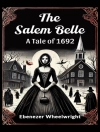In ‘The Harpe’s Head: A Legend of Kentucky, ‘ James Hall weaves a captivating narrative that intertwines the dark undercurrents of early American frontier life with a richly detailed exploration of folklore and myth. Employing an evocative literary style that blends elements of Gothic fiction with vivid historical detail, Hall paints a haunting portrait of the notorious Harpe brothers, whose gruesome exploits challenge the boundaries of morality and law in the nascent Kentucky wilderness. As Hall adeptly navigates the thin line between historical fact and creative interpretation, he immerses readers in a landscape where horror, adventure, and the human psyche collide, all set against the backdrop of 19th-century American expansionism. James Hall, an esteemed figure in American literature and a prominent advocate for the exploration of regional narratives, draws upon his profound understanding of Kentucky’s history and culture to fuel this gripping tale. His experiences as a traveler, writer, and keen observer of human nature inspired him to delve into the chilling legends surrounding the Harpe brothers, amplifying the historical authenticity with his signature narrative style that appeals to both the emotional and intellectual sensibilities of his audience. ‘The Harpe’s Head’ is not only a significant contribution to the genre of American Gothic literature but also an essential read for anyone seeking to grasp the complexities of early American society. Hall’s masterful storytelling and deep thematic explorations make this book a compelling choice for readers who appreciate a blend of history, horror, and rich narrative depth.
Over de auteur
James Hall (1793 – 1868) was an American author, literary critic, and jurist renowned for his early Western stories and keen observations of frontier life. Born in Philadelphia, Pennsylvania, he moved to the Midwest where he became deeply enamored with the emerging narratives of the American frontier. Hall’s seminal work, ‘The Harpe’s Head: A Legend of Kentucky’ (1833), is a keystone of Western literature, intertwining local folklore with the harsh realities of frontier existence. His literary style often melded regional dialect with detailed descriptions of the land and its people, capturing the rugged essence of early American life. While Hall’s writings might not carry the fame of his contemporaries, his works remain significant for their authentic reflection of antebellum America and their influence on the Western genre. In addition to his fiction, Hall contributed extensively to the cultural and literary discourse of his time through both his legal career and his editorial work with periodicals such as the ‘Illinois Monthly Magazine, ‘ which he founded. Hall’s careful chronicles of American expansion and rich character portrayals offer valuable insights into the era’s society and have cemented his place in the annals of American literature.












